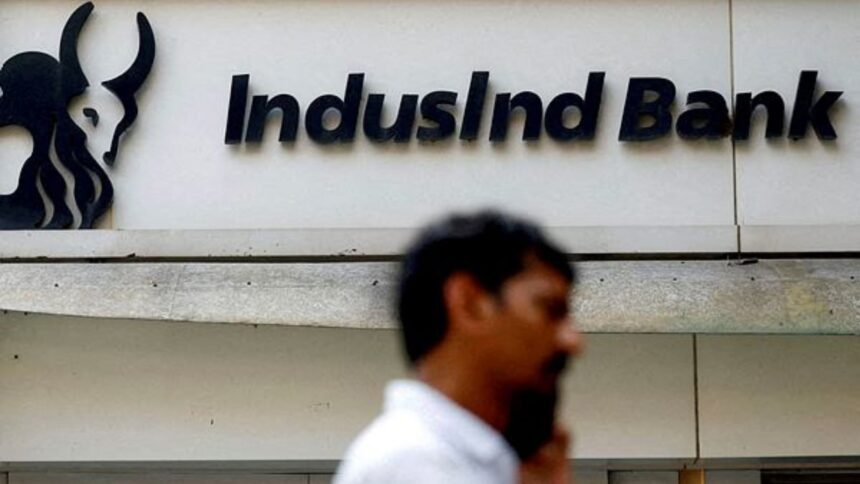Hit by losses in the derivative portfolio and weak asset quality, IndusInd Bank Ltd has reported a net loss of Rs 2,329 crore for the quarter (Q4) ended March 2025 as against a net profit of Rs 2,349 crore a year ago. On March 10, 2025, the bank disclosed that it noted certain discrepancies in its derivative portfolio. The internal review by the bank had estimated an adverse impact of approximately 2.35 per cent of the bank’s net worth as of December 2024. Following the disclosure, the bank’s Managing Director & CEO Sumant Kathpalia and deputy CEO Arun Khurana resigned in April.
Bank reported a for the quarter ended March 2025 as against a net profit of Rs 2,349 crore a year ago. This was mainly led by the derivative losses and rise in non-performing assets. It was the first quarterly loss for the bank in 19 years. The two new accounting discrepancies in interest income, unearthed in the internal audits last week worth Rs 674 crore and Rs 595 crore, were also reflected in the March quarter results. As a result, its provisions increased to Rs 2,522 crore in March 2025 as against Rs 950 crore a year ago.
The gross NPA increased to 3.13 per cent as against 2.25 per cent as on December 31, 2024. Net non-performing assets were 0.95 per cent as compared to 0.68 per cent.
“The Board and the Management acknowledge that the lapses happened have been unfortunate for an institution like our Bank. However, the Board along with the management have shown a strong resolve to address all the identified issues in a timely and comprehensive manner,” said Sunil Mehta, the Chairman of the Board of Directors, IndusInd Bank.
On March 10, 2025, IndusInd Bank disclosed that an internal review of its derivative portfolio had revealed a potential 2.35 per cent adverse impact on its net worth, which would have an impact of approximately Rs 2,000 crore on the bank.
While the bank sought to shift the blame to the Reserve Bank of India’s (RBI) change in rules relating to the derivative portfolio, the loss from the derivative book remained unresolved for a long time, leading to the accumulation of losses.
As per directives on investments issued by the RBI in September 2023, banks are prohibited from conducting internal trades/hedging and, accordingly, IndusInd Bank ceased internal trades from April 1 2024.
However, during an internal review, the bank identified certain discrepancies, wherein the accounting of losses on forex derivatives/ swap transactions executed prior to April 2024 (over the past 5-7 years) to hedge forex deposits/ debt were not recognised through NII (net interest income), while the corresponding treasury gains were recognised in the profit and loss (P&L) statement. Following the announcement, several broking firms downgraded the bank’s stock. Its shares crashed by 27 per cent on the stock exchanges on March 11.
Amid the derivative loss issue, the and the decision of CEO Sumant Kathpalia and Deputy CEO Arun Khurana to sell shares worth Rs 157 crore in the last two years came to the spotlight.
The bank appointed an independent professional firm to conduct a comprehensive investigation of derivative losses.
Allaying the fears of depositors, the RBI on March 15 said that IndusInd Bank depositors need not worry since the bank’s financial health remains stable. “There is no need for depositors to react to the speculative reports at this juncture. The bank’s financial health remains stable and is being monitored closely by the Reserve Bank,” the regulator said in a statement.
The bank is well-capitalised and the financial position of the bank remains satisfactory, the RBI said. “As per auditor-reviewed financial results of the bank for the quarter ended December 31, 2024, the bank has maintained a comfortable capital adequacy ratio of 16.46 per cent and provision coverage ratio of 70.20 per cent,” the RBI said. The liquidity coverage ratio (LCR) of the bank was at 113 per cent as on March 9, 2025, as against regulatory requirement of 100 per cent.
On April 15, IndusInd Bank said the report prepared by the external agency – PwC — showed Rs 1,979 crore of ‘negative impact’ to the net worth of the bank due to the derivative discrepancies.
“Based on the report, the bank said that it has assessed an adverse impact of 2.27 per cent to its net worth as of 2024,” the lender had said in an exchange filing. The bank also disclosed the ongoing review by an external agency which was independently reviewing the internal findings. “The report from the external agency identified discrepancies relating to derivative deals,” it said.
According to an audit report by Grant Thornton, two former officials of IndusInd Bank were allegedly involved in insider trading during a period when the bank faced accounting lapses in its derivative portfolio.
Weeks after IndusInd Bank disclosed accounting lapses and losses of nearly Rs 2,000 crore in its derivatives portfolio that triggered a rout in its shares, the bank’s Managing Director & CEO Sumant Kathpalia resigned with effect from April 29.
In his letter to the lender’s board, Kathpalia wrote, “I undertake moral responsibility, given the various acts of commission/ omission that have been brought to my notice. I would request that my resignation be taken on record at close of working hours today.”
A day prior to Kathpalia’s resignation, the bank’s deputy CEO Arun Khurana also resigned.
IndusInd Bank’s board has started the process for identifying potential CEO candidates.
The RBI has advised the lender to submit proposals for appointment of the new CEO for its approval by June 30, 2025. The bank said that its board is at an advanced stage in the selection process and is confident that recommendations will be submitted to the RBI well in advance of the timeline.
In the interim, the Committee of Executives (CoE) is entrusted to oversee the operations of the bank under the guidance of an Oversight Committee of the Board.








